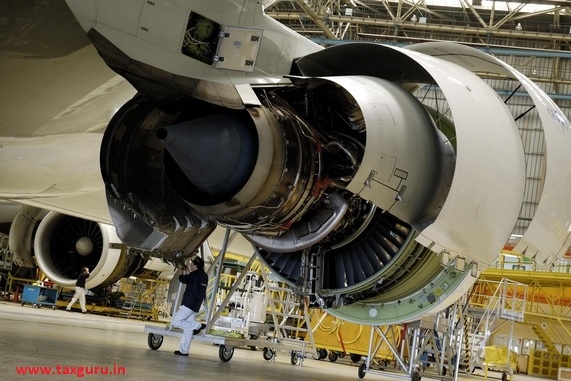Goods and Services Tax (GST) might have come with the motto of simplifying law. But the industry issues which were or are erupting due to new law or old issues which are still not resolved by GST, need the attention to overcome hurdles in daily business or trade. Aviation sector has not escaped its boat with smooth sailing either, from the numerous issues faced by the industry Maintenance, Repair and Overhaul (“MRO”) has been in the headlines from the very beginning. Therefore, we would be highlighting the issue and the effects of MRO services in the Indian industry.

Before we start with the issue, let us understand what is MRO service?
MRO service cover all types of maintenance and repair, but in relation to aircraft implies specialization in maintaining aircraft and their components, such as jet engines and landing gear.
As per Aircraft Act, 1934, ‘Maintenance’ “means the performance of tasks required to ensure the continuing airworthiness of an aircraft, including any one or combination of overhaul, inspection, replacement, defect rectification and the embodiment of a modification or repair or test”, inserted vide GSR No. 1001 dated 22.12.2010 and G.S.R. 50(E) dated 25.01.2011.
Therefore, MRO services relate to upkeep of aeroplanes for safe and better functioning of the aviation sector. This may cover overhaul, repair, inspection or modification of an aircraft or aircraft components.

But is there a compulsory requirement or need for MRO services in aviation sector?
In the aviation sector, it is a compulsory requirement to allow only those aircrafts which carry airworthiness certificate. They issue airworthiness directives (“AD”) from time to time to certified aircrafts where any non-compliance with relation to safety deficiency of aircraft, engine, avionics or other system exits they must be corrected. Where any outstanding AD not been complied it is not considered airworthy. Thus, it is mandatory to comply with AD.
This mandate is to comply not only national regulation but also to adhere international standards, of bodies such as the International Civil Aviation Organization (‘ICAO’).
Thus, MRO services are required to be carried out to comply with the laws laid down by Aircraft Act, 1934 and international standards.
Who carries out MRO services?
There are organizations which carry out the function of MRO services for various fields such as road, ships, aircrafts etc. But to function in civil aviation the organization must be certified to perform certain tasks on aircraft in accordance with their approval schedule.
The Director General of Civil Aviation (‘DGCA’) through Civil Aviation Requirements (CAR) certifies organization eligible to carry out MRO services vide CAR-145. Accordingly, to harmonise requirements with international requirements MRO service organization need to comply CAR.
Effect of taxation on MRO Services
Taxability of MRO service-
Under earlier regime, MRO services were taxed with both Service Tax (‘ST’) and Value Added Tax (‘VAT’) resulting in higher tax burden. Now, under GST law such works contract are treated as pure service transaction where supply include both goods and services, thereby removing the cascading effect of tax on tax.
The civil aviation i.e. Service Recipient (‘SR’) have two options either to avail the service from Indian service providers or import such services from outside India. The civil aviation would obviously choose to avail services from Service Providers (‘SP’) which would ultimately reduce their cost. The cost reduction requires analysis to cover among other things the ‘impact of taxes’ which would be our emphasis of highlight.
In the hands of Service Recipient
The persons who are required to comply with air creditworthiness, which include MRO services to satisfy air creditworthiness, are aircraft operators such as Jet airways, Spicejet, Indigo etc. known as SR.
Under GST, they are required pay taxes prescribed on invoice for services availed in India and under Reverse Charge Mechanism (‘RCM’) for services availed from outside India. Although input credit is allowed not GST paid by SR.
In the hands of Service Provider
The SP providing such services in India are liable to pay inflationary GST under Forward Charge Mechanism (‘FCM’) at the rate of 18% vide Entry no. 25 of Notification no. 11/2017-Central Tax (Rate) dated June 28, 2017. Although, Custom provides exemption on imports of spare parts for repair or overhaul vide Notification no. 23/2016-Cus dated March 01, 2016. This exemption was brought to bring the Indian industry at par with international organization.
Issue
The inflationary rate of 18% under GST law has scrapped flourishing business of MRO industry in India. There are around 110 MRO’s approved in India, of which only 7 are capable of carrying out overhaul of planes. But instead of increasing the players of MRO service provider and providing employment the GST law is having reverse effect on the industry, by closure of business operating as MRO SP.
As the SR are leasing out aircraft from outside India and also resting MRO service responsibility to owners of aircrafts the said service does not attract GST. Further, the burden of paying taxes under GST law is skipped even though they SR have to incur expenses on sending the aircrafts outside India. But the cost of taxes paid is lower to cost incurred on sending the aircraft abroad. Further, input credit may be allowed but still it blocks the cash flow for longer period of time.
The civil aviation industry has been requesting the GST Council to lower the rate on such services. The reason being to bring them at par with other players outside India, but till date the request has not been accepted.
Consequence
India is losing the flourishing business of MRO service having adverse effect on its motto of ‘Make in India’. If the services of Indian SP are continued it would not only increase the cost to civil aviation operators, but also have adverse effect on consumer using air services with the cost being recovered from the ultimate consumer.
The ultimate conclusion, leading Indian civil operators leasing out aircraft and thus availing the services of MRO from outside India. This would have adverse effect on the revenue of Indian treasury. Further, if the adverse consequences are not worked upon on early notice it would be a closure to MRO industry in India.





